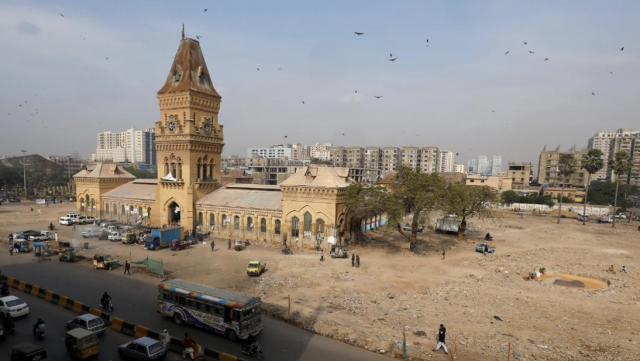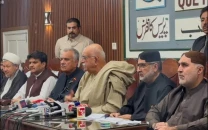Centre for appointing ‘neutral’ administrator in Karachi
AGP meets Sindh CM; allays PPP’s concerns about Centre’s interference in provincial affairs

As the four-year term of Karachi Mayor Waseem Akhar is set to end this month, the federal government has proposed to the PPP led provincial government of Sindh to appoint a “neutral” administrator to perform mayoral functions in Karachi.
A senior member of the federal cabinet revealed to The Express Tribune that the federal government desires to appoint a neutral administrator for Karachi and several names are under consideration in this regard. However, the Sindh government has yet to give its response to the proposal.
Another senior official said under the law an administrator can work for 120 days but his tenure may be extended till the provincial government enacts a new legislation for the local governments (LGs).
According to sources, Attorney General for Pakistan (AGP) Khalid Javed Khan also met Sindh Chief Minister Murad Ali Shah on Sunday to allaying the PPP’s concerns.
The AGP assured Shah that the Centre is not going to intervene in Sindh’s affairs by imposing the governor’s rule or by invoking Article 149 of the Constitution in a bid to put Karachi under the federal government’s control.
The state’s top law officer, however, communicated to Sindh CM that the federal government desires that a powerful local government system is introduced in Karachi as the incumbent LG system in the country’s commercial hum does not give meaningful power to the mayor.
Prime Minister Imran Khan has also asked AGP Khan to push for empowering the LGs in the apex court. It is expected that the Supreme Court will take up the matter in the next couple of weeks.
The Supreme Court has already decided to review Punjab and Sindh local governments laws in view of Article 140-A of Constitution, which says each province shall establish an LG system and devolve political, administrative and financial responsibility and authority to the elected representatives.
This insertion was retained in the Constitution through the 18th Constitution Amendment during the term of the PPP’s last federal government. Despite passage of 10 years, none of provincial governments has given meaningful powers to the local governments.
Some senior lawyers believe that the Supreme Court should interpret this constitutional provision and force the federal and provincial governments to transfer administrative and financial powers to the LGs.
In 2015, the SC in its judgment in the Lahore Development Authority (LDA) case declared that any attempt by a provincial government to make the local governments powerless will not be countenanced by the court, which will strike down such legislation.
“If a provincial government oversteps its legislative or executive authority to make the local government powerless then such exercise will fall foul of Article 140-A of the Constitution and an excessive or abusive exercise of such authority will not be countenanced by the court,”
The order, authored by former chief justice Mian Saqib Nisar, said some meaningful political, administrative and financial authority must be devolved to the local governments.
“The creation of a local government system and the conferment upon the local government of certain political, administrative and financial responsibilities does not deprive the province of authority over its citizens and deny it a role in the progress, prosperity and development of the province,” said the order.
It said the local government system did not spell the end of the provincial government in a province. To the contrary, it strengthens the provincial government by entrenching democracy at grass roots level.
“Once a provincial government has enacted a statute devolving certain basic functions to the local government, it loses its powers to amend the provincial law,” the SC noted.



















COMMENTS
Comments are moderated and generally will be posted if they are on-topic and not abusive.
For more information, please see our Comments FAQ